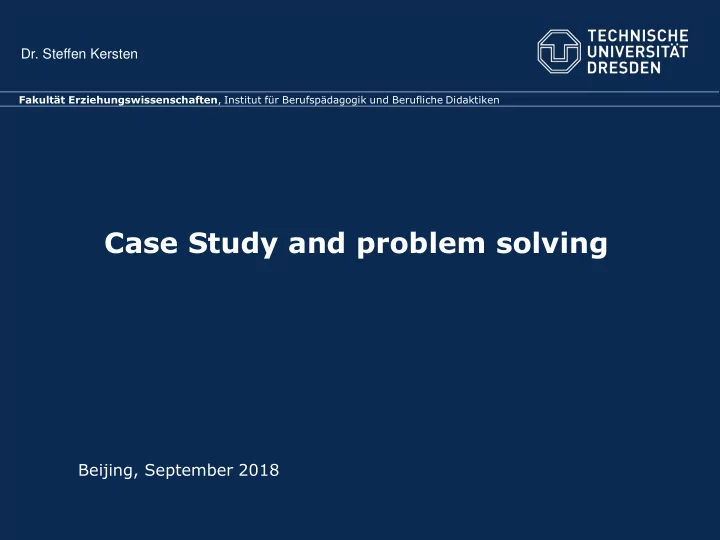

Dr. Steffen Kersten Fakultät Erziehungswissenschaften , Institut für Berufspädagogik und Berufliche Didaktiken Case Study and problem solving Beijing, September 2018
Case Studies - History - Historical roots in the casuistry of the legal and medical teaching - Casuistry (Latin casus, "case") generally refers to the consideration of individual cases in a particular subject area. Case study as a method of knowledge- Case study as a teaching method finding by individual case study through case-based problem solving Harvard Business School Lecture Schedule 1908: „In the courses on Commercial Law, the case-system will be used “ Source: Kaiser 1976, p.51 - Transfer of the case method in the business area under W.B. Donham(2. Dean) - Order at the Harvard Bureau of Business Research to collect case materials for all subjects Folie 2
What is a Case Study? 1. A complexe teaching method 2. Problem solving process is in the foreground 3. Problem situation mostly from practice 4. Learners must have the problem situation independently analyze and develop solutions to problems in group work 5. The different solutions should a critical Evaluation are subjected to. Vorlesung „Projektmethode“ / Dr. phil. Steffen Kersten Dresden, 27.01.2010
Problem Solving Process
Phases of Case Study 1. Confrontation with the case - The case will be presented to the learner. - Information on the case will be collected. - Problems and decision needs to be clarified. 2. Evaluate information - Processing of the questions in groups - Material is provided or must be searched independently. - Results of the group work are presented in plenary. 3. Exploration and resolution options for action - Courses of action are to develop and discuss. 4. Defense of the proposals for action - The different courses of action are to present and justify. - The action decision is to make. 5. Collation with reality - The prepared solution of the case is to compare with the solution in the reality.
Varia iants ts of the work rk with case studie ies Method Problem Acquisition of Problem solving Criticism of recognition information solution Case-Study- Focal point: Information is Possible solutions to Comparison of the Method hidden problems given the problem are to solution with the need to be identify and decisions decision in the real analyzed to made world Case- problems are Information is Focal point: Comparison of the Problem- clearly stated given Possible solutions to solution with the Method the problem are to decision in the real identify and decisions world to made Case- the case is Focal point: Possible solutions are Incident- incomplete Information is to to identify. The case is Method represented acquire solved. independently Stated- problems are Information is The final solutions are Focal point: Problem- given given given. Critique of the Method It will look for given solutions alternative solutions. cp. Kaiser, F.J.: Entscheidungstraining 1976, S. 55
Brainstorming Principle of the Method: Brainstorming benefits from: - retrieval of unconsciously or unappreciated knowledge - positive thinking and elimination of criticism - the heterogeneously group Creative problem solving by combining seemingly unrelated elements
Preparation, process and evaluation of the brainstorming Brainstorming- Evaluation Preparation meeting Choose a Rules: Complement of heterogeneous not a criticism, ideas in consultation allows many wild ideas, group of people continuation of idea approaches Classification and invite 5 to 10 evaluation of ideas participants Procedure: co-ordinator explained topic, Location: unusual announcement of the ensure observance of trouble-free proposed solutions the rules environment time: 15 - 45 minutes visualize ideas on a Information about: flip chart problem, rules
Problem-solving by motivated modification of information Information Motivation Modification of information Approximation Alienation - Thinking - Analogy - Induction - Association - Deduction - Creative confrontation - Simplification - Inversion - Sequencing - Provocation - Try and Error - Transformation
Morphological analysis Basic rules for knowledge discovery after Renè Descartes (1596-1650) (Discourse de la Mèthode) * Dissect each problem into as many parts as possible … * Arrange your thoughts. Start with the simplest and then work step by step * Compile a comprehensive list of all the facts. Get an overview, that you're sure to have miss out nothing
Process of morphological analysis to solved Current problem abstract Basic problem Problem elements = The basic problem is to decompose Parameter (What?) for each parameter, the known or possible characteristics are to compile solutions = characteristics for each parameter, the seemingly Optimisation optimal value is to select the optimal values of all parameters Combination are to combine
Morphological analysis - example
Synectics Excursion Stage Explanation 1. Problem as given Transmission of the problem by an expert 2. Analysis of the Discussion about the problem problem 3. spontaneous spontaneous ideas for solutions are to give reaction 4. Problem as the better understood problem is to reformulate understood 5. First direct for a technical problem are to find analogies in nature and vice versa analogy 6. Personel analogy personal feelings concerning an analogy are to describe 7. Symbolical from the feelings, conflicting words are to form (adjective + conflicting noun) analogy 8. Second direct from the word pairs are direct analogies to form analogy 9. Examination detailed description of a chosen analogy 10. Force fit Drawing conclusions from the description of the analogy 11. Solution as Formulation of the proposed solution understood
Dr. Steffen Kersten Fakultät Erziehungswissenschaften , Institut für Berufspädagogik und Berufliche Didaktiken Thank you for your attention Beijing, September 2018
Recommend
More recommend